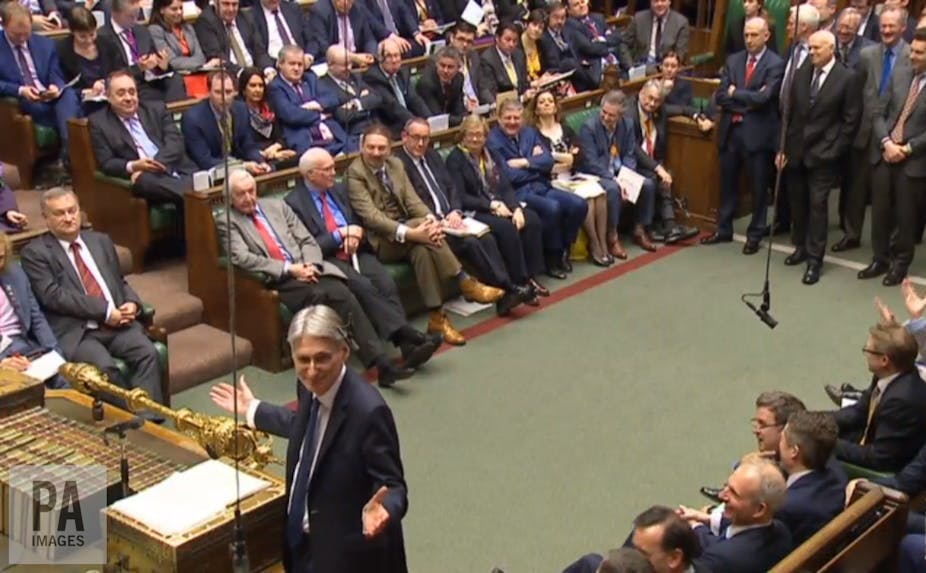Just one week after announcing that it would raise national insurance for self-employed people, the UK government has U-turned on the policy. Despite being politically contentious, the reversal is more symbolic than substantive, at least from a fiscal perspective.
The proposed tax rise was only ever going to raise a very modest amount and was actually progressive in its effects. It was an attempt to reduce the large tax gap between the self-employed and employees and was justified on fairness grounds. In this sense, the fact that it broke a manifesto promise was no bad thing.
The U-turn, however, is more significant for what it says about the general course of the government’s economic policy-making. It reflects a lack of serious thinking around issues of tax reform. It also exposes flaws in current policy towards supporting a stronger and more inclusive economy.
Deeper problems at play
The fact is that the government faces problems with the tax base. Its ability to fund spending out of taxation has become constrained. The chancellor, Philip Hammond, admitted to this fact in his letter announcing the U-turn. He referred to “a structural issue in the tax base, on which we will have to act” and linked the issue directly to rising self-employment in the UK.
Yet there are deeper problems that go beyond the increase in the number of self-employed workers. These problems relate to changes in the UK labour market. The rise of low-paid and insecure work has held back tax receipts. It is not a matter of people en masse avoiding tax; rather it is matter of them not earning enough to contribute in a significant way to the total tax take.
The point is that structural changes in the labour market – such as the rise in zero hours contracts, temporary and agency employment, and involuntary self-employment – over the last few decades have eroded the tax base. They have helped to create a fiscal gap in the UK budget that the chancellor now needs to fill.
The drive to make the labour market more “flexible” has been actively encouraged by successive governments as a way to combat unemployment and inflation. It has meant worse wages, inferior career prospects, and dire working conditions for many workers. It now seems to be affecting the tax base, in a way that is concerning to the government. But, notably, it took fiscal pressure rather than concern over the lives of workers to prompt a (now-scrapped) change in policy.
Wholesale review
Commitments to fund social care and the NHS more generally will require more than piecemeal changes to the tax system; they will require a wholesale review of tax policy. Specifically, these commitments cannot be met without the move to a more progressive tax system. Taxes on profit and high incomes are key here and should take precedence over tinkering with national insurance for the self-employed.
If the government was truly serious about its commitment to tackle the tax base problem, it would be looking to reverse its policy to cut corporation tax. It would also look to raise taxes for higher earners. Those with the broadest shoulders should take more of the burden of taxation. Lower corporation tax and inaction to raise taxes on high incomes implies a tax system that is skewed in favour of big business and the rich.

The U-turn on the national insurance plan masks the fact that the government’s welfare reforms are predicted to hit the poorest in society the most. Proposed benefit cuts will leave the poor worse off. Instead of worrying about a minor change in national insurance, politicians – and the media – should be worrying about the real hardships caused by these cuts.
Investment needed
The truth is that the UK economy remains in a very precarious position. Growth, to the extent that it is occurring at all, is being driven by higher consumption. With wages stagnating, the growth in consumption is being supported by higher borrowing and higher debt levels. This situation is not sustainable and the budget did nothing to address the structural problems of the UK economy.
The best way for the government to support the economy is to invest. Funding infrastructure and creating a strong (not token) industrial strategy should be priorities. Ultimately, higher tax receipts require a government committed to supporting, through its investment policies, better paid work.
If the chancellor was really committed to reviving the tax base and with it the fortunes of the UK economy, he would be seeking to reverse his government’s policy of austerity.
Sadly, the chancellor appears entrapped by reactionary forces in the media and on the Conservative backbenches. He is unwilling to take even modest steps to resolve pressing problems of taxation and remains ideologically opposed to anything other than a cuts agenda. The country will be poorer materially and socially for his cravenness and dogmatism.

